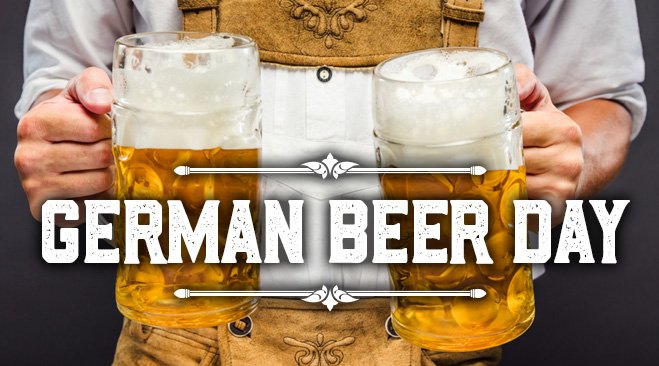Updated for 2024
Hold onto your Lederhosen, we’re about to drop some knowledge. German Beer Day on April 23 traces its origin all the way back to 1516 when the beer purity law – or Reinheitsgebot – effectively outlawed any ingredient other than barley, hops and water in the brewing process.
What about yeast? They didn’t yet understand its function. Essentially, the law was consumer protection, keeping prices low and dangerous, sometimes hallucinogenic ingredients out of beer.
What about your favorite Hefeweizen or Weißbier which uses wheat instead of barley? Eventually, they expanded the law to include any malted grain and, of course, yeast.
And that’s it – four ingredients, yet so many possibilities! After extensive taste testing, we’ve compiled our favorite breweries that make the most out of what they’re working with to deliver prost-worthy flavor.
The inspiration is in the name! Old world standards executed with modern tech allow Altstadt – German for Old Town – to deliver beer with a smooth, crisp flavor, thanks in part to the fresh waters of Texas Hill Country.
Established in 1878, this family-owned brewery in the foothills of the Alps is famous for a full range of award-winning Bavarian specialty beers, all infused with the culture and rich brewing heritage of the region.
Nestled in the Rhineland near the Südeifel National Park, this brewery uses only the best hops from Hallertau in Bavaria and Holsthum near Bitburg. The care they take in gathering, examining and using superior hops shows in their premium beers.
Back in 1972, the innovators at this German brewery were cooking up the first non-alcoholic beer, all legal according to the Reinheitsgebot. The skeptical public fell in love once they tasted it, embracing NA beer and changing the beer world forever.
Perfecting beer since 1886, this traditional brewery strictly adheres to the Reinheitsgebot. They specialize in Weissbier – never brewed anything else, in fact – and consider themselves ambassadors of Bavarian hospitality.
Tracing their roots back to 1363 and the Franziskaner cloister near Munich, this brewery both leans on tradition and innovates with the times. They’ve perfected Weissbier thanks to their Bavarian hops and malts, specialty wheat and waters from their very own spring.
Starting as a small brewery in Munich in 1417, they put their name on the map after the union of Joseph Pschorr and Maria Theresia Hacker, the brewmaster’s daughter. The rest is history, including the development of their signature lager, Münchner Gold.
Also hailing from Munich, Hofbräuhaus is beer royalty and claims their brews follow recipes descending from a Bavarian duke, a relative of the one who signed the Reinheitsgebot into law – no wonder their logo is a crown!
Brewing in western Germany since 1858, König defied the times and resisted the trend of brewing top-fermented beers, resulting in a pilsner that has withstood the test of time. In addition to the Reinheitsgebot, they are committed to sustainability in their sourcing, brewing and hiring practices.
From the home of Oktoberfest, this Munich-based brewery began with monks in a monastery and now delivers their delectable, purity law-compliant brews to 70 countries world-wide.
This brewery born near Dresden attributes some of their passion for pilsner to the crisp Saxon air – but don’t worry, they aren’t violating any laws by brewing with it.
The first to brew wheat beer outside Bavaria in Dortmund, North Rhine-Westphalia, they made a name for themselves with beer mixes. Although the inclusion of fruit juices does violate the Reinheitsgebot, the wheat beer base is fully compliant.
This 125 year old brewery made a splash in Munich by brewing light beer in dark times – as in, times when everyone was drinking dark beer – and continue to brew exceptional quality beer thanks to the purity law and the purity of the water in their own wells.
Named for the small German town where they got their start, this family-owned brewery has an ace up their sleeve when it comes to one of the four ingredients: The extra-soft water from a reserve in the surrounding forest gives their brews a distinctive and delicious flavor.
With over 1,000 years of brewing experience, Weihenstephaner predates the Reinheitsgebot but claims some credit for the purity law, and they even boast the name Bavarian State Brewery Weihenstephan.
This iconic Belgian wheat beer takes a couple liberties from the Reinheitsgebot by adding coriander and orange peel to their beer – so if four ingredients just doesn’t sound like enough for you, this is our recommended cheat beer.




